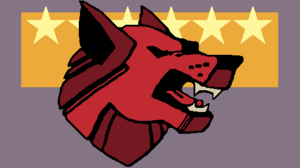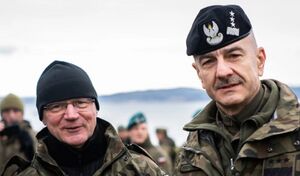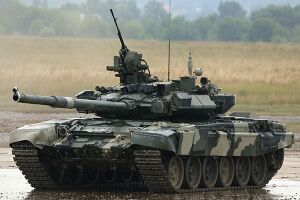Syaran Commonality Armed Forces
| Syaran Commonality Armed Forces | |
|---|---|
| Вооружени сили во заедницата на Сиаран | |
 Insignia of the SCAF | |
| Founded | 1988 |
| Service branches | Syaran National Army Commonality Air Force Syaran Commonality Navy |
| Leadership | |
| Executive | Anita Beleska |
| Personnel | |
| Military age | 17 |
| Conscription | Partially enforced, 18 |
| Available for military service | 33,579,905 males, age 17-45, 34,028,110 females, age 17-45 |
| Fit for military service | 27,689,410 males, age 17-45, 28,127,815 females, age 17-45 |
| Reaching military age annually | 3,049,622 males, 3,048,145 females |
| Active personnel | 890,000 |
| Reserve personnel | 2,860,000 |
| Expenditure | |
| Percent of GDP | 1.3% |
| Industry | |
| Foreign suppliers | |
The Syaran Commonality Armed Forces are the military forces of Syara. The Syaran Commonality Armed Forces, when combing both active duty and reserves, are the largest military force in Tyran. The Executive is the Commander-in-Chief, and presides over the Minster of Defense and the Central Command of the SCAF.
The SCAF is officially one of the youngest armed forces in Tyran, having been founded in 1988 after the conclusion of the Refusal War. Although the SCAF does not consider itself the direct successor of the Army of the Syaran Republic or the Navy of the Syaran Republic, the SCAF inherited much of it's organization, doctrine, and equipment from both services.
The SCAF is composed of three main branches, the Syaran National Army, the Commonality Air Force, and the Syaran Commonality Navy.
History
The Syaran Commonality Armed Forces were laid out in the Commonality Constitution in 1988 and are recognized as the official armed forces of Syara. The splintering of the Army and Navy of the Syaran Republic during the Refusal War left Syara with no functional armed forces, as both the Wardens and the Royalists claimed lineage from the Republic's armed forces, and by the end of war both had been supplamented by conscripted personnel and militia. The Commonality Constitution officially established the SCAF and divided the service into three branches, the Army, the Navy, and the Air Force. Syara's coast guard, border guards, internal security forces, and law enforcment were constitutionally defined as separate and under the jurisdiction of the Ministry of Security.
The SCAF spent much of the 1990s organizing itself and modernizing its equipment and armarments, much of which had been left in a state of disarray in the aftermath of the Refusal War. It wasn't until the the Imerti Conflict with Ruvelka, Syara's traditional enemy, that the SCAF was give a more defined role and designed to counter a specific threat. In 2008 the SCAF engaged in the Zemplen War, where it expanded to accomodate over four million men and women in uniform. Despite its success on the battlefield, poor strategy and planning undermined Syaran efforts and the SCAF was dealt a decisive blow at the end of the conflict.
Demobilization following the Zemplen War occurred simultaneously with a rapid expansion of the SCAF's standing forces and reserves. By 2014 the SCAF's reserves had expanded to become the largest in Tyran, and the SCAF was officially recorded as the largest armed forces in the world. The SCAF has spent the years since the Zemplen War modernizing and refining it's military capabilities.
Structure and organization
The Syaran Commonality Armed Forces are officially divided into three separate branches, the Syaran National Army, the Syaran Commonality Navy, and the Commonality Air Force. The Commonality Constitution defines the Executive of Syara as the commander in chief of the SCAF. The Ministry of Defense operates as the admistrative body for the SCAF, overseeing the legal, admistrative, financial, and political aspects of the SCAF. The Defense Minister holds the second highest position within the SCAF after the Executive, and is responsible for reporting on the status of the SCAF to the Executive and the Syaran government. The Ministry of Defense is tasked with reporting budget requests, personnel numbers, and readiness levels to the High Council both are regular sessions and upon request of the Syaran government
Operational command of the SCAF falls under Central Command (SCAFCC). Central Command maintains the day-to-day operations, military readiness, maintenance, and functionality of the SCAF. The primary governing body of SCAFCC is the Senior Staff, which is headed by the Chief of Staff. The SCAFCC Chief of Staff is the highest operational comamnder of the SCAF, and as part of the position is considered to be the highest ranking military member of the SCAF. The Central Command Senior Staff is composed of Senior Representatives of each of the three branches, the four Realm Commanders, and the leaders of each directorate. The Senior Staff is responsible for the overall operation of the SCAF, as well as the establishment of doctrine, military stratgey, technological development and procurement, mission definition, and personnel allocation. Each branch is served by a Senior Representative, who is considered the highest ranking position within their respective branch. The Realm Commanders are the designated commanders of all military forces within each of Syara's four Realms; Makedon, Galania, Scitaria, and Hayreniky. The Realm Commanders are operational commanders whose focus is primarily on military readiness, training, and maintenance of the capabilities of the SCAF forces under their command. SCAF directorates are bureaus assigned to specific tasks within the SCAF that are essential to its operations. The directorates are Joint Operations, Design and Procurement, Administration and Personnel Magement, Legal and Financial, Logistics and Supply, Material and Infrastructure, Intelligience, and International Assistance and Cooperation.
The SCAF's operational forces are divided into four military districts known as the Realm Forces, one for each of Syara's administrative subdivisions known as Realms. The Realm Forces are led by the Realm Commanders, who are the primary operational commanders in the SCAF in terms of day-to-day activities, military readiness, training exercises, and basic administration. The Realm Forces consist of elements from each of the three branches, as well as their reserve components. With nearly 700,000 personnel assigned to them, the Realm Forces constitute the vast majority of the SCAF's combat power and active duty formations. Distribution of resources and manpower between the Realm Forces is not equal and based on strategic positioning and geography; for example Realm Force Scitaria contains a disproportionate amount of the Syaran Commonality Navy, while Realm Force Makedon contains much of the Syaran National Army's armored formations. Each Realm Force is commanded by a Field Marshal from one of the SCAF's branches, usually selected based on their strategic role within the SCAF.
Doctrine and mission
The Commonality Constitution defines the role of the SCAF as the "defense of Syaran soil, people, and faith". To this end the primary missions of the SCAF are territorial defense and protection of Syara's population and national religion from perceived threats. The 2018 Military and Sevurity Strategic Review reaffirmed the primary objectives of the SCAF as preservation of Syaran territorial integrety and the protection of Syara's vital national interests. The 2018 review further stressed that Syara's security situation is "potentially unstable" given Syara's geopolitical position and highlighted the need for the SCAF to remain strategically flexible.
To this end the SCAF's strategic planning rests on two primary principles; first that Syara's most likely possibilty for armed conflict rests with Ruvelka, and that any other conflict with potential adversaries would almost certainly not be limited to just Syara against a single foreign power. As a result the SCAF has poured much of its resources and effort into creating and maintaining a general conventional superiority over the Imperial Armed Forces of Ruvelka. While suffering defeat in the Zemplen War, the SCAF maintains a belief that Syaran military capabilities are largely superior to Ruvelka's own, and that given free reign the SCAF would be able to triumph over the IAFR. The SCAF has identified the strategic realm as being the most critical to military success, highlighting Syaran issues with manpower and financially supporting the war effort as the biggest contribution to Syara's defeat. In order to prevent this possibility from reoccuring the SCAF has devoted significant time and money into streamlining Syara's procurement and manufacturing process while also creating an indepth reserve system to assure Syaran manpower needs are met in the event of a future war.
In combat operations, the SCAF identifies the necessity of seizing the initiative and the proper care of logistical demands as the most critical to achieving victory. To achieve this the SCAF has focused heavily on the ehancement of Syara's techical and electronic reconnaisaince means and intelligence gathering. In addition, the SCAF has continuously developed and refined its ability to handle complex logistical operations that involve supplying dozens of armored and mechanized divisions, allocating proper maintenance to thousands or airframes, and proper utilization of Syara's fleet of combative surface veseels. This has resulted in varying measures for the induvidual branches; the Syaran National Army has seen an extensive expansion of its national and strategic reserves, making it the largest army in Tyran. The Syaran Commonality Navy has eschewed construction of aircraft carriers, nuclear submarines, and large numbers of guided missile cruisers in exchange for an abundance of anti-ship missiles and coastal missile batteries. The Commonality Air Force has abandoned its large fleet of fixed wing attack aircraft and dismissed the idea for strategic bombers in exchange for large numbers of unmanned aerial vehicles and fighter aircraft.
Personnel and equipment
Syara operated a mixed-conscription/professional volunteer service. Mandatory military conscription is officially the law in the Commonality, but during peacetime a draft lottery is utilized. Those wishing to abstain from military service on moral grounds can apply for a military deferrment. Syaran conscripts serve for two years in the Syaran Army, and three in the Navy and Air Force. Upon completion of their service, conscripts are discharged from the active service and are automatically enrolled within the Strategic Reserve of their branch, which are they are kept in for five years. The Strategic Reserve does not correlate to any actual formations or duties, but is a register of all recently discharged military servicemembers who would be priority for recall to service in the event of armed conflict. Conscripts also have the option of volunteering for service in the National Reserves, during which they are assigned to a reserve unit and are required to attend training exercises during the summer and once every two months. Women are except from conscription, but may volunteer for service.
Syarans wishing to avoid conscription have the option of volunteering for service. In exchange for better pay and a longer term of service (minimum contract lengths are fours years for the SNA, five for the CAF and SCN), volunteer service members have the the option of chosing their military tasking, effectively their job, while receiving higher priority for promotion and specialized training. Roughly 65-70% of the SCAF are contract personnel, with the remainder being conscripts. All officers and over 90% of all non-comissioned officers are contracted personnel. Officers in the SCAF are usually graduates of military academies, with each branch maintaining their own distict service academy. Certain state universities and private colleges within the Commonality also offer programs for those seeking comission within the SCAF.
The total strength of the active component of the SCAF amounts to 890,000, smaller than most of Tyran's military powers, but its reserve component of 2,860,000 is the largest. Combined the SCAF amounts to 3,750,000 men and women in uniform, making it the largest military force in Tyran.
Syara manufactures much of its military equipment, with domestic production of small arms, armored vehicles, artillery, air defense systems, ships and aircraft. Fighter aircraft is one area where Syara is not self-sufficient, relying on the Ossorian designed T-35 Séideán, which Syara produces under the desingation Zephyr. The SCAF maintains a total of 17,789 armored personnel carriers and infantry fighting vehicles, 10,000 main battle tanks, 9,500 artillery pieces, 2,225 air defense systems, 215,000 utility vehicles, 1,518 helicopters, 1,296 fighter aircraft, 202 attack aircraft, 1,008 UAVs, 4 missile cruiers, 15 destroyers, 28 frigates, 17 corvettes, and 12 submarines.


